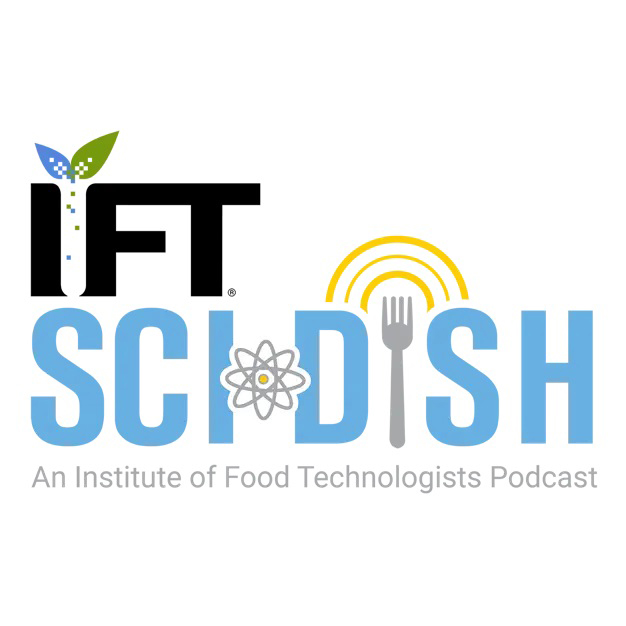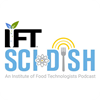EP 20: Sensory Science Series - “Culinary Quantitative Description Analysis QDA”
- IFT Sci Dish
- EP 1: Strategies to Communicate
- EP 2: The Changing World of Nutrition
- EP 3: The Fuzzy Front End of Product Development
- EP 4: Consumers Don’t Want to Change, So Why Are They
- EP 5: Flavor is Key
- EP 6 Growth in Food Production Requires “Inside Knowledge”
- EP 7: Microalgae
- EP 8: Pet Food: The Surprising Use of Science
- EP 9: Fresh Produce
- EP 10: Current State of African Swine Fever
- EP 11: The Challenge of Water
- EP 12: A CRISPR Food Future
- EP 13: Hackathon Winners
- EP 14: Cold Plasma
- EP 15: Wellness Flavors
- EP 16: Career Conversations
- EP 17: Barley and the promise of upcycling
- EP 18: Alternative Meat and a More Sustainable Food System
- EP 19: Bird Flu - Sorting Fact from Fiction
- EP 20: Sensory Science Series - “Culinary Quantitative Description Analysis QDA”
- EP 21: Sensory Science Series - “Fast & Early”
- EP 22: Plastic on Your Plate
- EP 23: DEI’s Role in Supporting a Sustainable Food Ecosystem
- EP 24: The Sweet Side of Toxicology
Join host Bruce Perkin and speakers Becky Bleibaum and Heather Thomas as they discuss Quantitative Description Analysis (QDA.) QDA is a sensory tool that was developed in the mid-1970s to correct perceived problems with flavor profile analysis. During this conversation, the speakers will be covering what QDA is and how it works, QDA strengths compared to other tools, taking QDA into a new space, making sure consumer voices are not lost when using culinary professionals and more.
Guests
 Rebecca N. Bleibaum is the president and chief of sensory intelligence at Dragonfly SCI. She has over 30 years of experience in applying sensory and consumer research with major multinational businesses. She is a co-developer and instructor of UC Davis Extension’s popular and long running Applied Sensory & Consumer Science course.
Rebecca N. Bleibaum is the president and chief of sensory intelligence at Dragonfly SCI. She has over 30 years of experience in applying sensory and consumer research with major multinational businesses. She is a co-developer and instructor of UC Davis Extension’s popular and long running Applied Sensory & Consumer Science course.
 Heather Thomas was a key member of Tragon Corporation from 1989 to 2017. As their Vice President of Research and Analysis, she played an integral part in the development of product optimization methods, segmentation analyses, and advanced multivariate analysis and modeling techniques. Her extensive experience with experimental design and choice-based modeling has helped guide multinational companies to create products that appeal to consumers. As the developer of the Maximizer, she has created an operational predictive tool that integrates sensory, consumer, and instrumental measurements to guide product development and marketing groups.
Heather Thomas was a key member of Tragon Corporation from 1989 to 2017. As their Vice President of Research and Analysis, she played an integral part in the development of product optimization methods, segmentation analyses, and advanced multivariate analysis and modeling techniques. Her extensive experience with experimental design and choice-based modeling has helped guide multinational companies to create products that appeal to consumers. As the developer of the Maximizer, she has created an operational predictive tool that integrates sensory, consumer, and instrumental measurements to guide product development and marketing groups.
Host
 Bruce Perkin is the principal scientist and operator of Robust Food Solutions LLC, a food science-based consultancy that has operated since 2017, providing strategic advice and hands-on support to food businesses in the areas of quality systems and food safety, innovation, product development, and organizational design.
Bruce Perkin is the principal scientist and operator of Robust Food Solutions LLC, a food science-based consultancy that has operated since 2017, providing strategic advice and hands-on support to food businesses in the areas of quality systems and food safety, innovation, product development, and organizational design.
Bruce is a Certified Food Scientist, a Certified HACCP practitioner, and is a Certified Manager of Quality and Organizational Excellence through the American Society for Quality. He is also a Preventative Controls Qualified Individual under the FSMA regulations. He has completed Food Defense training through the FDA and the FSPCA. Bruce is a past Chairperson of the Dallas /Fort Worth chapter of IFT, and also a past Chair of the Food Service Division of IFT. In addition, Bruce is a part-time Adjunct Professor at Texas Womens’ University teaching NPD, Food Science and Food Safety to Culinology students.


IFT Sci Dish Podcast
IFT Sci Dish explores science, research, and perspectives from multiple disciplines related to the science of food and food innovation, each aimed at sparking new ideas to ignite innovation in your work and career. Developed by IFT’s topical Divisions, member experts and special guests discuss important topics, challenges, and solutions impacting food science and technology today.




